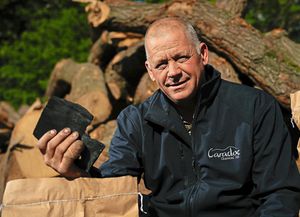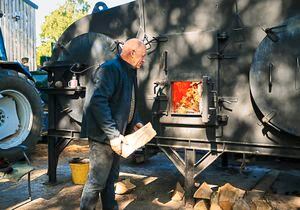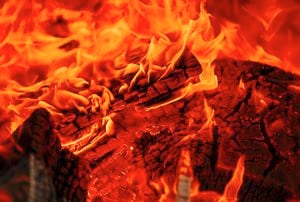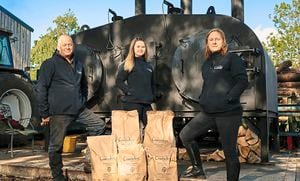On fire with flavour: Meet the Shropshire charcoal producers
Charcoal was first used for smelting tin and copper to make bronze for swords, axes and jewellery around 4,000 years ago.

Today it’s the fuel of choice for barbecue and outdoor cooking enthusiasts to enhance the flavour of their food.
The National Coppice Federation estimates that more than 110,000 tonnes of charcoal is used in the UK every year – yet more than 95 per cent of this is imported from abroad.
Flying the flag for locally-made charcoal is Shropshire couple Kevin Fryer and Charlotte Smith, who are proud to offer a product that is British from source to completion.
Much of the charcoal available in supermarkets has been produced in countries such as Namibia, Paraguay and Nigeria where woodlands are less likely to be sustainable.
Kevin and Charlotte, who live in the heart of the Stretton Hills, only use sustainably sourced British wood for their business Caradoc Charcoal.
“We can trace the origin of the trees where all of our wood comes from and it’s all felled in the UK under licence from the Forestry Commission. The equipment we use is British made so we can guarantee a 100 per cent British product,” says Charlotte.
Kevin has been working in the firewood industry for more than 25 years and they decided to branch out into producing charcoal last year.

They soon found their product to be popular with customers, ranging from families enjoying a barbecue in their back garden to professional chefs turning to cooking with fire in their restaurants.
Making charcoal is very much a labour of love for Kevin whose working day begins when a lot of us are still tucked up in bed.
“I’m out at 2.30am so I see more of the world than most. Farmers are the same, they wouldn’t do it if they didn’t want to get up in the morning,” he tells Weekend.
The couple, who live in Leebotwood, near Church Stretton, believe they are the only producer in Shropshire to be using the retort method which heats the wood to the point where it expels all of its gas and impurities.
Kevin received help and guidance from Roger Bannister, at Pressvess in Kingswinford, where the retort was made, and Nick Harris, from Four Seasons Fuel, to set up his operation. It takes two days to produce between 200 and 250kg of charcoal and the process involves one day of burning and one day of cooling.
Kevin, who carries out the burning process three times a week, uses a mixture of hard woods which create a product that is fast lighting and will also burn hot.
Once their timber arrives at their yard from Shropshire Forestry Contractors, it is chopped into billets and put in a kiln to begin the drying process before being loaded into a steel retort
A fire is lit in the middle and the temperature of the wood starts to rise. As it does, all of the moisture is sucked out of the timber. When the temperature passes 110c, the final traces of water in the wood begin to disappear. The gasses found naturally within the wood are expelled and burnt within the fire box as it soars past 290c.

“When it gets to 400c the wood is now charcoal. At this stage it still contains a percentage of tar. We need to burn the tar out of the wood so it’s good quality charcoal so we let the temperature get up to 450c to 500c,” explains Kevin.
This whole process can take between 10 and 12 hours depending on the wood and its moisture content. It is then left to cool for 24 hours before being bagged up.
Nothing is wasted as two by-products are biochar – dust and smaller pieces of charcoal which are sieved out and can be used in agricultural and horticulture – and wood vinegar which can be used to tackle green fly on roses.
As well as it being a natural product, with a minimal carbon footprint, the couple pride themselves on their charcoal working far more efficiently than the usual shop bought varieties.
“It lights fast, it gives a good, clean heat with not much smoke and it gets up to temperature very quickly,” says Charlotte.
“Personally, I never used to like barbecue food, I found it had a weird flavour. When we started making our own charcoal, I realised it was the supermarket charcoal that was tainting the food. Now I cook over charcoal two or three times a week,” she says.
“I love seeing people using our product,” adds Kevin. “People often say they didn’t realise charcoal was made in Shropshire and they are blown away by the process involved. I like working with wood and making a green product. It’s an industry that is growing quietly. There aren’t many people doing it and our nearest competition is probably 70 to 90 miles away,” he says.

It’s very much a family business as their 18-year-old daughter Fran runs the business’ social media pages and helps to promote their product.
From Edinburgh to London, orders have come flooding in for their charcoal from around the country. Outdoor cooking and fire pits have become increasingly popular in recent years with more people creating meals with the help of a barbecue grill or meat smoker.
As well as outdoor home cooking enthusiasts they also supply some top chefs, farm shops and restaurants including Fallow in Mayfair, Hencote in Shrewsbury and Adam Purnell – the Shropshire Lad. Charlotte and Kevin also work closely with nearby firm Kadai Fire Bowls, which produces award-winning cookware and fireside accessories.
“A lot more people are cooking outdoors these days and a lot take it very seriously and have dedicated barbecue areas in the gardens. There are some hardened barbecuers out there and they will cook outside all year round. Chefs are using it in their restaurants to bring out new flavours. Everybody who uses our charcoal loves it,” says Charlotte.
* For further information see www.caradoccharcoal.co.uk





